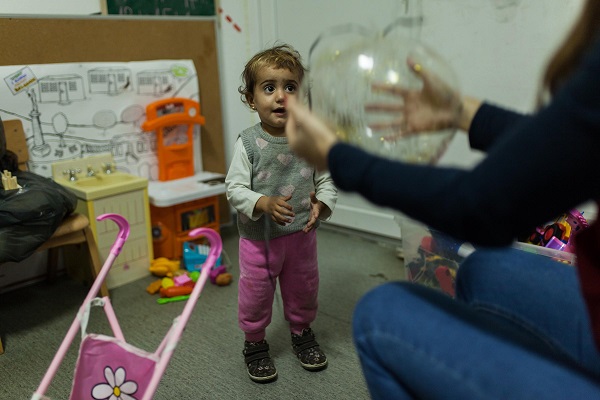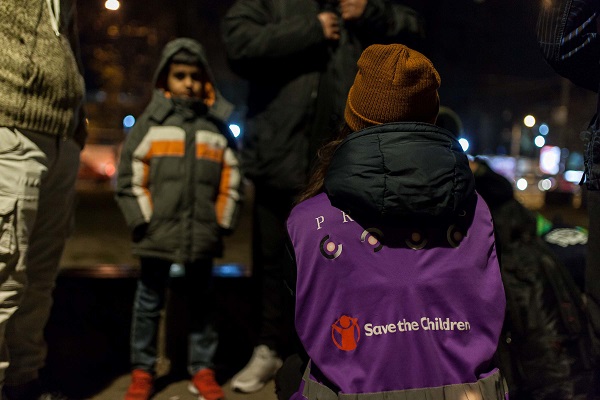 North West Balkans
North West Balkans
Languages
“We spent the war years in Syria, but we couldn’t stay there anymore”

Amira* with facilitator in a child friendly space in Belgrade. Photo by Boško Đorđević, Save the Children.
“We spent the war years in Syria, but we couldn’t stay there anymore” says 28-year-old Alma*, sitting on a small chair in the child friendly space in refugee aid centre Miksaliste in Belgrade. Her children, toddler girl Amira* and 4-year-old Hussein* have scattered toys around to play with. In the room next door, her husband talks with the authorities about the accommodation in one of the refugee reception centres in Serbia. Next to Alma*, a young woman is sitting, secretly wiping tears from her eyes. She is engaged to Alma’s brother-in-law, who left Syria two years ago and is in Germany now. The five of them left their country hoping that they will be able to join him.
Their journey took them through Turkey, Greece, Albania and Kosovo* to reach Serbian capital Belgrade. The outreach team run by Save the Children and the partner organization Praxis, working to help newly arrived refugees and migrants travelling the Western Balkans route, encountered the family in a city park, near the central bus station. The family was accompanied to Miksaliste where another partner organization, the Centre for Youth Integration, runs the safe space for children and families.
Alma* and her family come from the area of Qamishli, a city in north-eastern Syria. “Both of my children were born during the civil war,” says Alma*, “We lived in insecurity every day, often leaving our village to go to other places where we could find more safety. There were not enough doctors or medications and the water was scarce. I am happy that my children are healthy because the pregnancy and raising them in these conditions was difficult.”
The number of arrivals and countries of origin of refugees and migrants travelling through the Western Balkans Route and Serbia has been changing since the start of the refugee crisis in 2015 depending on many factors, such are the situation in the countries of origin, situation in the countries of transit and even the weather conditions. But, the flow continued, and over 47,000 new arrivals were registered in the Balkans in first nine months of 2019. While Syrians made majority of the arrivals in 2015 and 2016, their number dropped in subsequent years, only to increase from autumn of 2019. Close to 1,000 Syrians were supported by Save the Children and partners in Serbia from September to November. Many of them were new arrivals, people who recently left Syria due to the recurring conflicts, precariousness and resulting lack of infrastructure and services.
“We waited and waited for things to get better, but they didn’t. It’s still not safe in Syria and we stopped believing that peace will ever come, that’s why we left”, says Alma*.
The family crossed the sea with 35 other people in a small and unstable rubber boat. “There was a 15-day-old baby in our group. We were all very afraid”, says Alma*. After a short stay on one of the Greek islands, the family continued their journey. “We walked and walked, our feet got swollen, children cried, we didn’t have enough food or water. We don’t have a single nice thing to remember from the journey” says Alma*.
In Miksaliste, the family found a much-needed shelter and a place to rest. Miksaliste provides services for more than 1,000 children and adults each month, ensuring daily spaces and overnight shelter for children travelling alone, families and other vulnerable groups as well as information and referrals to social services, registration and accommodation in the refugee centres in Serbia. Previously run by NGOs, it has been transferred to the management of the Serbian Commissariat for Refugees and Migration, ensuring longer term sustainability. Miksaliste remained a crucial aid point for tired and vulnerable refugee and migrant children and adults travelling through the most frequently used migration route to Europe. Save the Children has been working in Miksaliste from 2015, both providing direct services and supporting the running of the centre by supporting operational costs.
Refugees and migrants arriving in Miksaliste need to decide what their next step will be. Alma* and her family wish to reach Germany where they feel that they could find support in building their life as they have family members there.
“I remember Syria before war, it was a beautiful place. People smiled and cried together. Now, everyone is on different sides. I wish for my children to go to school, because school is very important. Without school, it’s like you are blind. The schools in Syria are destroyed,” says Alma*.
“I would be happy to return once my country becomes a good place for people again. Now, it still isn’t,” she adds sadly.
